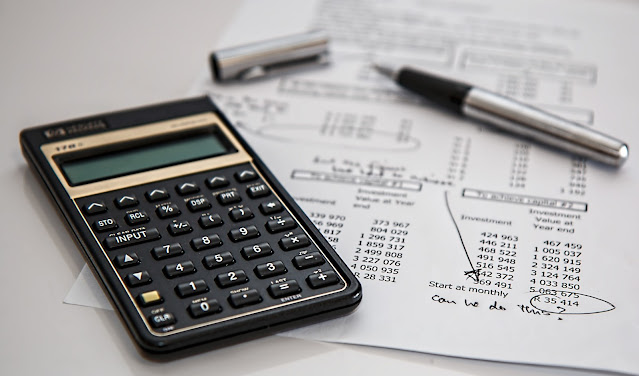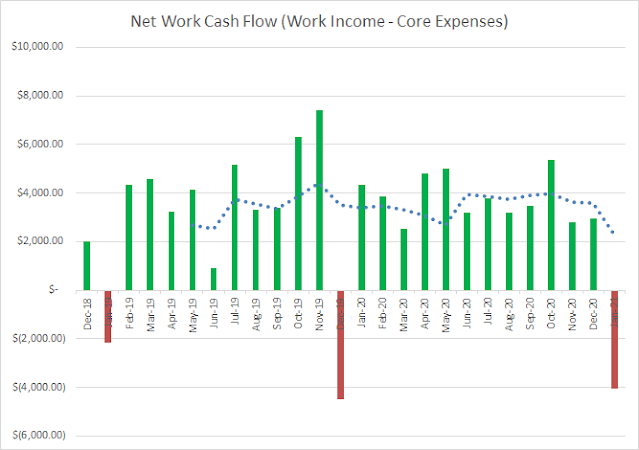Budget Check & Cash Flow Update - January 2021
 |
| Budget Check & Cash Flow Update - January 2021 |
The saying goes that cash is king. While that's true, a more accurate saying when it comes to finances is that CASH FLOW is king. Whether you're retired, still working or just starting out the only way you can improve your financial house is to have positive cash flow.
If you're in the accumulation phase then that positive cash flow allows you to save and invest to build up your future cash flow. If you're already retired, or FIREd, then congratulations because I'm sure your cash flow is well above what you need.
When it comes to personal finance it's rather simple: income - expenses = savings and savings x investing x time = financial independence. There's obviously two main levers there and while we'd all like to increase our income, many times reducing expenses is some of the low hanging fruit that you can go after to increase your savings.
Budget Check
Total income for January was solid, but not spectacular comparatively speaking. Total income from all sources came to $6,417.02 for the month which is well below the TTM average of $7,583.12 although that average does include the sizable tax refund from last year and the unexpected stimulus checks. The bulk of my income, ~65%, came from my day job, le sigh; although that should come as no surprise since we're still in the accumulation phase. Dividends were the next largest recurring income source at 8% with other income showing a huge increase to 24% thanks to the stimulus checks. Interest and writing made up the remainder at 0.2% and 3%, respectively.
Total expenses for January came in at $8,233.31 which was a considerable uptick by all measures. That was mainly due to the $6.1k property tax payment which definitely stung. We also made $1,350 in additional debt payments on my car loan which has us in line to get rid of that loan in March, maybe February depending on how aggressive we feel like getting. The TTM average now sits at $4,468.35.
Looking at just core expenses, January's total came to $8,233.31 once again making a sharp turn higher due to the property tax payment. The TTM average core expense is still showing a nice downtrend falling to $2,911.57. Back of the envelope math puts us at ~$2.5k of monthly excess cash flow that we can put towards investing, savings or other uses. That's a bit lighter than I'd like, but I'd be foolish to complain about that.
For the month we ended up with a net negative cash flow of $3,276.14 when looking at all income sources. Based on just work income, but including all expenses, the net negative cash flow came to $5,528.17. That's a bit misleading due to the property tax payment that we had saved for throughout the year, but it is what it is.
Our savings rate from all income sources came to -51% while our savings rate from work income alone was -133%. Oooof! No worries though as that will remedy itself starting in February.
*A few notes about the cash flow check in. All income is only income that I receive and does not include my wife's income likewise for the expenses. We've found it's easiest for us to just keep separate accounts since I'm gone most of the time for work. Also, pre-tax withholding for the 401k (I currently withhold 7% in order to get the full 5% employer match) and the ESPP through my employer (4% post tax withholding) are not included in the above savings amount.
Net Work Cash Flow
While my net cash flow above includes all income and all expenses, I wanted to get a more granular look at the cash flow that is available each month. So I started calculating my Net Work Cash Flow which is calculated as post-tax income only from my work and core expenses. Think of it more like a free cash flow for a business.
The above might be the true cash flow each month; however, it's not really representative of our "free cash flow" each month. The idea is that all other income sources outside of work income are already going directly into savings or investing or in the case of dividends remaining in the brokerage account. On the expense side the majority of our expenses fall into the core side and most of the other expenses are extra debt payments rather than further discretionary spending.
I believe this gives a better idea of our "free" cash flow from "normal operations" each month that can/will be used for debt reduction, saving and investing.
My net work cash flow was a deeply red at -$4,068.32 for January. Once again that property tax payment reared its head. The 12-month average is pretty strong at $2,538.95
Non-Work Cash Flow
Passive income for January totaled $541.67 and covered 6.6% of core expenses. Meanwhile, non-work income totaled $2,252.03 and covered 27.4% of core expenses for January.
Conclusion
I'm pretty excited for what 2021 will be bringing to the table. We're close to being rid of the loan on my car which will free up plenty of cash flow each month for other purposes. Assuming income and expenses stay roughly the same I'm expecting to have around $2.5k of "free" cash flow to invest each month which will help to turbocharge the investment portfolio or even allow us to purchase some property somewhere which both my wife and I have been wanting for a while now.
Make sure you sign up to receive new posts to your email so you don't miss anything. And be sure to follow me on Twitter @JC_PIP to get up to the minute news of purchases for my portfolio or if you prefer Pinterest or Facebook I'm on there too.
Are you on the verge of making any significant improvements to your cash flow?



Comments
Post a Comment